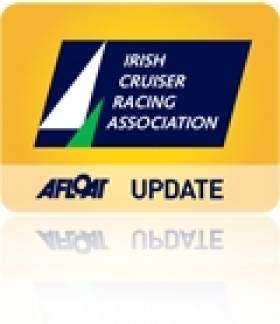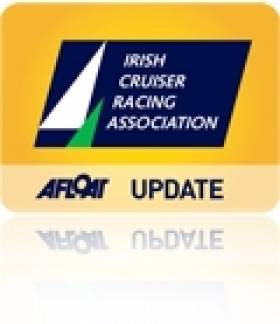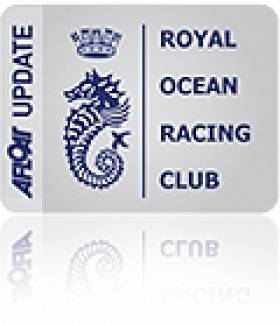Displaying items by tag: Handicap
Yacht Handicap Fees Increase for 2016
Yacht handicapping fees will rise by 12.5% for the coming season.
An average sized boat, such as a Sigma 33, will now have total handicapping costs of €177 in 2016 as opposed to €162 in 2015. This breaksdown as follows: ECHO registration is €42. IRC online registration is €13.50 per metre, an increase of €1.50 per metre (12.5%)
The Irish Sailing Association (ISA) is the administrator for both the local ECHO and international IRC handicap systems. IRC certs are processed for the ISA by the London based Royal Ocean Racing Club (RORC) who govern the IRC rule.
The ISA's CEO Harry Hermon says IRC fees are set in € for Irish boats at the beginning of each year. 'The IRC fee structure sent out with the renewals in January 2016 and showed a 12% increase which is due to the sterling exchange rates. There are no changes to the ECHO fees for 2016. Handicap fees will not be reviewed again until 2017'
Ireland has a national cruiser racer fleet estimated between 500–700 boats.
Meanwhile, handicaps will be a focus at the 2016 ICRA conference when it gets underway at the Castletroy Hotel in Lmerick on Saturday, March 5th.
The pow–wow will receive a presentation from the promoters of the ORC handicapping system that is gaining popularity as an alternative to IRC. Florida's recent Key West Regatta in Florida was split between the two systems.
Speaking to the Irish Times last Friday, former ICRA commodore Norbert Reilly said: “We have no idea what ORC is but would like to know and especially why it is making so much progress overseas.
ICRA also plan a review of the ECHO system for 2016.
#icra –The Irish Cruiser Racer Association (ICRA) has published details of provisional handicap divisons for its National Championships and Sovereign's Cup 2015 off Kinsale next month.
The sensible bands is a sensible arrangement of similar sized (if not speed) boats in each class which keeps competition tight in a very good turnout of at least 101 boats.
While there will no doubt be the inevitable usual thorny issue of production cruiser/racers say in IRC 0 (Beneteau First 40, Dufour 44, Salona 45 etc) having to compete with custom race boats (Mills 37, Ker 37, Ker 40 etc) this is always the challenge for IRC in how to equitably rate these different boat types.
The make–up of a new class two fleet out of a previously unwieldly class one is the most noteworthy aspect of the new racing bands. The Beneteau 34.7 Black Velvet will be the scratch boat in the new class that also sees X332s separated from J109s. Modified Half–tonners, all now deemed to be fully optimised, are also now in the new 15–boat class two.
Each division is extremely competitive but especially so in class one where J109s Jelly Bay and Storm are lining up for honours with Rockabill, a Corby 33 and Bob Exemple (Xp33) in a super turnout of 20 class one entries. And more are expected.
In breaking out the 101 boat fleet, there are also 12 Class zeros.16 class three boats will be racing and 20 in class four. Two white sail divisions of ten and eight respectively make up the 2015 fleet.
Download the new divisions as a pdf file below.
ICRA's Barry Rose adds:
All five provisional DIVISIONS have attracted competitive fleets from all coasts of Ireland. This will be a true test of national champions. With equal status/trophies and ISA gold, silver and bronze mounted medals being awarded by ICRA to both IRC and Progressive ECHO, all entrants are given a fair chance to compete for overall honours.
Division 0 features a strong fleet from the Kerr 40 Keronimo to the Ker 37 Jump Juice, the Farr 42 WOW and the likes of Corby 36's Roxy 6 and Stratisfear against the Mills 36 Crazy Horse with local knowledge in Freya and Godot. Also Roxstar, another high-performer from Scotland.
Division 1 sees Corby 33 Rockabill challenge sister ship Imposter, and a clutch of J 109's which includes past champions Storm and Jellybaby together with competitive XP33 Bon Exemple. This class, including A35's Gringo and Fool's Gold – recent winner in Scottish series - is building to produce a great battle for honours.
Division 2 will see an equally intense contest between the likes of modified half-tonners Checkmate XV, The Big Picture and Harmony and the very competitive X332's Dexterity and Equinox and also with top-rater Black Velvet. Provisionally this is a new Division and should provide great racing for all – taking some boats from usual Divisions 1 and 2.
Division 3 again is ultra competitive with the Corby 25's, X302's and older but very competitive Slack Alice and Dis a Ray.
Division 4 has Black Fun, Cartoon, Cri-Cri and Supernova, the modified quarter tonners which are expected to dominate this class together with recent Solent winner Aquila. The J 24's Hard on Port, Ya Gotta Wanna and Crazy Horse, and the slippery Blazer 23 Shilelagh will be all out to upset the above predictions as will the Sigma 33's which include Sigma champion Tim Goodbody..
In addition the non-spinnaker Divisions, with a fine fleet of 18 boats, will compete for ICRA's Corinthian Cups on IRC and ECHO. Boats do not need endorsed IRC certs in these divisions.
The Irish Cruiser Racing Associtation (ICRA) has been given a ringing endorsement of the scoring system deployed at the cruiser national championships in Tralee by the Royal Ocean Racing Club (RORC) in London who see the Irish dual scoring system 'providing balance and parity'.
Even though Kerry was judged as a remote venue from the major cruiser-racer centres of Dublin and Cork it still managed to pull bigger numbers than for example those who contest the British IRC nationals. A fact Water Rat refered to last week in a piece on Ireland's event sustainability.
"In Ireland, all races are dual scored under both IRC and ECHO, the Irish national performance handicap system. ECHO is then 'managed' to ensure that the keen racers don't win under both systems. It works - Ireland has the largest number of boats racing per capita, per mile of coastline, or any other way you measure it. " said the RORC's Mike Urwin.
Of course it is something Irish cruiser racer followers have known for sometime. WM Nixon refered to it recently in his Afloat.ie blog (Echoes of the Republic up North) in April.
It is no secret that RORC's Rating Office, the technical arm of the Royal Ocean Racing Club and gatekeeper for the IRC rating rule in the UK, supports the use of local and national performance handicaps. Far from being in competition with IRC, properly administered handicap systems complement it by bringing new people into the sport and igniting their competitive spirit.
The Rating Office is optimistic that owners move into IRC when they feel they have 'outgrown' performance handicap racing, and recognises that it provides an ideal introduction to the sport. However, if your club usually splits boats between local handicap and IRC classes, this can mean unsatisfactory racing in small, fragmented fleets with large variations in performance.
One option for overcoming this is what Mike Urwin, RORC Technical Director, refers to as 'the Irish solution' and the joint use of ECHO and IRC.
Urwin contends that this allows those new to racing to compete in a larger, mixed fleet with a handicap that is adjusted to reflect their performance. As they become more experienced and their handicap increases, those sailors become less interested in the handicap result and more interested in getting an IRC result. It encourages newcomers, (especially if they beat the local favourite!) and produces better racing, as Urwin explains:
"Instead of splitting the fleet into 'club' and 'IRC', everybody races together with class splits based on speed if there are enough entries. Everyone gets a result in the handicap class, and those with an IRC certificate also get a result in the IRC class. Both classes have the same status on the noticeboard and the same prizes."
For performance handicaps and dual scoring to work well, the handicap system must be administered progressively and updated on a weekly, race by race basis. It does not work if a handicap is set at the beginning of the season but never changed!
For handicap racing and dual scoring in the UK, the RORC Rating Office recommends the new RYA National Handicap for Cruisers (NHC) alongside IRC. The Rating Office is very happy to advise clubs on dual scoring.
Rating Cost of Composite Rigging to be Reduced in 2011
The rating cost of composite standing rigging will be reduced with effect from 1st January 2011 following a recent meeting of the IRC Technical Committee.
The Committee noted that the technology of composite standing rigging has matured significantly in recent years to the extent that it is now becoming close to mainstream.
There is now evidence that composite standing rigging has a life expectancy at least that of steel rod rigging.
In parallel, the cost of composite standing rigging has fallen to the extent that some brands are now available at costs only a little higher than the equivalent steel rod rigging.
Composite standing rigging is also now beginning to become available as a standard option from production boat builders.
Noting all of the above, the Committee has concluded that the rating cost of composite standing rigging will be reduced with effect from 1st January 2011 (1st June 2011 in IRC southern hemisphere countries). This notice has been issued now to enable owners considering either new boats or modifications to their existing boats to plan accordingly.
The exact effects on TCC are not yet available. The Committee’s intention however is that the effects should in future be broadly neutral in terms of speed versus rating. The effect of composite standing rigging will also continue to vary from boat to boat
































































